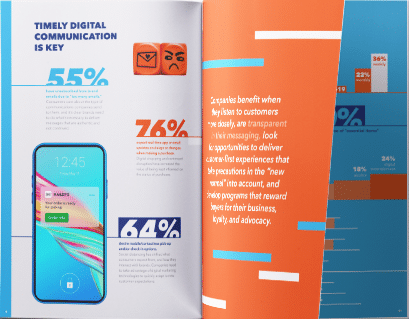Five-thousand consumers from around the world share insights with Selligent Marketing Cloud on their shifting priorities amid the global pandemic and how brands can meet changing expectations.
Business unusual: Time for empathy, flexibility, and customer-first experiences to shine
If 2020 has taught us anything, it’s that the unexpected can change our way of doing business, and how consumers engage with brands, overnight.
It’s also shown us that brands and consumers are resilient; it’s in our human nature to come together during a crisis and find solutions to adapt, overcome, and keep moving forward.
In the latest Selligent Connected Consumer Index, we surveyed 5,000 global consumers to ask how the pandemic has influenced their behaviour and to gauge how their expectations of engagement with brands are shifting. What matters to consumers today? What do they expect of brands going forward? How can marketers better meet those expectations?
Bottom line: we’re all moving in uncharted waters. None of us can predict the future.
As marketers, we can examine the data on consumer behaviour during this time, use technology to truly get to know our customers, and craft messaging and interactions that resonate with how they experience life today.
The tenets of exceptional connected customer experience are as valid as ever; underlying the holistic experience that consumers have with a brand – even as the economy temporarily shifts their priorities toward price and product quality, as the report reveals. Yes, some of the data in this report will surprise you.
But it’s data that gives marketers the basis to innovate and adapt.
At Selligent, we believe that marketers play a key role in bridging consumers’ evolving needs and expectations with products and services; marketing automation is central to supporting that.
Use this report to glean timely insights into how consumer behaviour is shifting and how you can deliver personalised, meaningful brand engagement that resonates with consumers.
We invite you to stay positive. Seek the opportunity this time in our collective history offers us: more human interaction, more empathy, and the chance to truly show up for our customers and each other, in ways that matter.
By the numbers: global highlights
Times are changing
Seventy-five per cent have had their jobs and income negatively impacted due to COVID-19, but optimism is still strong. This has an obvious, direct impact on consumer spending, with most people focused on essential shopping online. However, consumers are buying more often than before, and greatly welcome messages that offer sales and deals on things most relevant to their needs.
Fifty-eight per cent believe that remote work will be a part of their future. However, this belief is much stronger in younger generations, which requires marketers to have a nuanced approach to consumer communications and promotions strategies to stay relevant.
Fifty-six per cent intend to make new purchases to reflect this new remote work lifestyle, but data shows that consumers remain cautious about “non-essential” spending. Putting emphasis on value will go a long way towards encouraging consumer purchase.
Consumers are yearning for more
Fifty per cent rate product/service quality or product pricing as top loyalty drivers. Customer experiences matter, but consumers also value how brands are trying to help them during this time, whether it be through delivering excellent customer service, providing a great product, or especially by offering more affordable pricing.
Fifty per cent rate buyer perks and free product as most likely to make them brand advocates. This commitment from brands is pushing customers to be more loyal and advocate for brands, but other factors also play a role in instilling confidence in a customer. Free stuff, great buyer reward programmes, and perks go a long way.
Thirty per cent say they’ll give brands more than five chances to keep their loyalty, up from 24 per cent in 2019. Overall, consumers are generally more patient and flexible, giving brands more opportunities to make experiences right before they switch. While privacy remains important, 36 per cent are willing to trade some of it for really strong customer experiences, up from 26 per cent in 2019. They are also paying closer attention to new factors, like a brand’s mission, values, and executive behaviours.
Timely digital communication is key
Fifty-five per cent have unsubscribed from brand emails due to “too many emails.” Consumers care about the type of communications companies send to them, and it’s clear brands need to do what’s necessary to deliver messages that are authentic and not contrived.
Seventy-six per cent expect real-time app or email updates on delays or changes when making a purchase. Digital shopping and continued disruption have increased the value of being kept informed on the status of purchases.
Sixty-four per cent desire mobile/contactless pick-up and/or check-in options. Social distancing has shifted what consumers expect from, and how they interact with brands. Companies need to take advantage of digital marketing technologies to quickly adapt to new customer expectations.
Companies benefit when they listen to customers more closely, are transparent in their messaging, look for opportunities to deliver customer-first experiences that take precautions in the “new normal” into account, and develop programmes that reward buyers for their business, loyalty, and advocacy.

